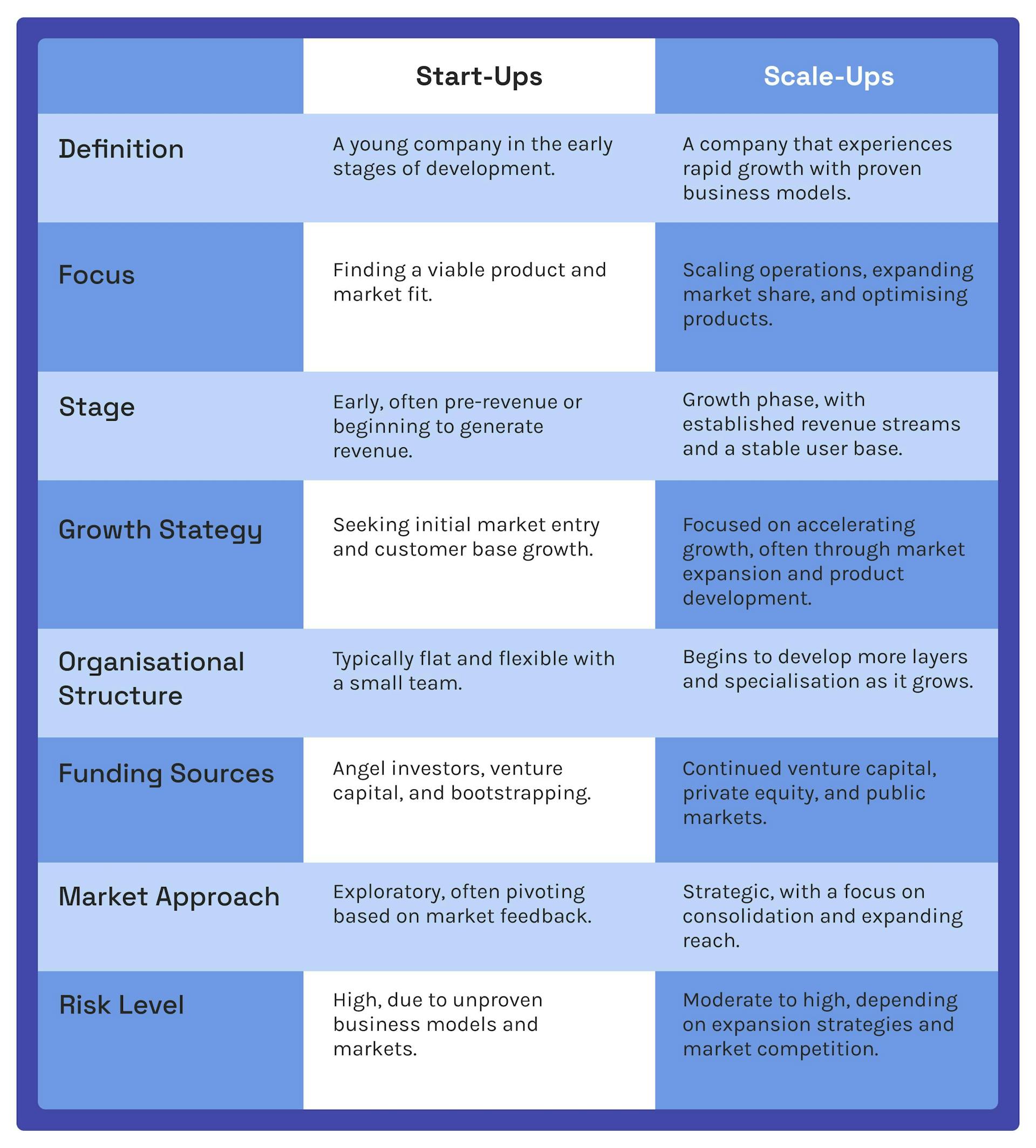Strategies For Success: Navigating The Scale-Up Company Journey

Scaling up is a pivotal phase for any company. It signals a transformation from the trial-and-error start-up phase to an established business ready for bigger things.
This stage is more than just increasing sales or market reach; it involves navigating the complexities of scaling your operations, team, and company culture without losing the agility and innovation that sparked your initial success.
However, the reality is sobering: data shows that only 4.6% of startups become scaleups. If you aim to grow your company and ensure its long-term success, understanding how to manage this phase effectively is key.
This article will explain what it means to scale up your business. We’ll also share what we've learned from working with scale-ups and how to navigate this transition to the next stage of your business journey.
What Is a Scale-Up Company?
A startup becomes a scale-up when it experiences rapid growth after a viable business model and product-market fit have been established.
💎 What is product-market fit?
Product-market fit refers to how well a product or service meets the needs and desires of a particular group of customers.
It shows that a product effectively solves a problem or fulfils a need in the market and resonates with customers to the extent that they want to buy it.
It's a critical milestone for businesses because it proves that the product is valuable and sets the stage for future growth.
This change doesn't happen all at once but comes from reaching several key goals. Here are some signs that show a company is in the scaleup phase:
📈Exponential growth rate: A common benchmark is achieving a profitable growth rate of at least 20% annually over three years, in terms of revenue or customer base.
📈Market validation: Achieving product market fit is another indicator of a successful scale-up. This means that the company's products or services have been accepted by the market, demonstrated through a growing customer base and repeat business.
📈Expansion of operations: The business is expanding its operations, which can include entering new markets, scaling up production, and growing the team size significantly.
📈Professional management structure: There’s a shift from a startup's informal and sometimes chaotic management to a more structured and professional organisational setup. This includes clear roles, departments, and processes.
📈Increased workforce: A significant increase in employee count, which is often necessary to support the expanded operations and growing demand for the company's offerings.
📈Advanced funding rounds: Moving beyond initial seed funding and Series A rounds to secure larger, more substantial Series B, and C investment rounds aimed at scaling operations.
📈Scalable business model: The company has developed or is developing scalable systems and processes to handle increased business without a proportional cost increase.
📈Strategic focus on growth: The leadership is focused on strategies for rapid expansion, whether through scaling existing offerings or developing new products and services.
How Do Scale-Ups Differ from Start-Ups?
Having explored the characteristics that define a scaleup company, it's clear that the journey from a startup to a scale-up involves significant evolution.
To give you a better idea of the transition, we’ve broken down the major differences between start-ups and scaleups:

When Is the Right Time to Scale Up?
Figuring out the right time to scale up is all about shifting your focus from just keeping the business alive to actively growing it.
There isn't a clear-cut schedule or a one-size-fits-all approach to scaling up, and truthfully, not every startup will evolve into a scale-up.
According to insights from McKinsey, a hefty 80% (some data even suggests as many as 90%) of startups don't successfully navigate their scale-up phase.
In our experience with helping scale-ups grow, we've seen several reasons that explain why they might not have made it, including:
⚠️ Misjudging market interest: It turns out that 42% of startups stumble because they thought there was more demand for their product or service than there actually was.
⚠️ Cash flow issues: It's easy to run into trouble by not managing your money well or by trying to grow too fast.
⚠️ Leadership growing pains: As the company grows, leaders often find it hard to adjust to their evolving roles and the new demands of a larger business.
⚠️ Business model issues: Some businesses aren't set up in a way that lets them grow easily or make a profit as they expand.
⚠️ Competition: It's challenging to keep up with, or stay ahead of, bigger companies or new competitors.
⚠️ Ignoring customer feedback: Overlooking what customers are telling you and not improving your product can hurt your business.
⚠️ People and culture challenges: As you grow, it can be tough to find and keep the right people and maintain a strong company culture.
While the transition is challenging, there are steps and strategies that founders can take to manage this process and scale their business successfully.
Mastering the Transition: How to Become a Scaleup
Moving from a startup to a scale-up is a big step for any founder. It's not just about expansion; it's about adapting and changing how you think and work.
This section will share what we’ve learned over the years in helping companies scale up. We’ve narrowed down five practical strategies for founders ready to take on this challenge.
Optimise Operations for Scalability
As your business grows, the complexity increases exponentially. In the initial phase, startups have an “all hands on deck” approach. When scaling, startups must evolve and restructure to accommodate this growth.
This is not just about expanding your team or widening your product offerings; it's about designing an organisation that can adapt, evolve, and thrive in changing market conditions and overcome scaling challenges. To achieve this, you need to adjust your organisational structure.
Here’s how:
Break Up Your Team into Manageable Units
Up until now, your team has been wearing many hats. However, as you scale, moving from informal structures to establishing dedicated teams for functions such as sales, marketing, HR, finance, and product development is essential.
Dividing the team into manageable units helps distribute tasks more efficiently and fosters expertise in each domain.
This specialisation enables the company to manage its growing responsibilities more effectively, paving the way for streamlined processes and clearer accountability.

When scaling up, founders often face the challenge of moving from a startup mindset to establishing more structured processes and systems necessary for a larger organisation.
This transition doesn't mean losing the startup's inherent flexibility; rather, it’s important to integrate this flexibility into the organisational design itself.
A flexible organisational design—where teams and roles can evolve and processes can be adjusted with minimal disruption—allows a company to pivot or adapt without the need for extensive restructuring.
This adaptability is crucial for seizing new opportunities and addressing competitive threats.
Decentralise Your Decision-Making
Most of the decisions are left to the founder of a start-up, from how to go about client acquisition to hiring a junior social media manager.
Scaling companies spread out decision-making authority across various levels of the organisation.
It involves empowering mid-level managers and front-line employees by granting them the autonomy to directly make decisions that affect their work.
This approach is rooted in the belief that those closest to the work—those on the ground—have valuable insights and are better positioned to make informed decisions quickly.

As companies scale, the simplicity of decision-making processes and the informal communication channels characteristic of smaller teams begin to strain under the weight of increased complexity. As a founder, one of your key challenges is establishing clear lines of authority.
Knowing who to turn to with questions or issues is key to preventing confusion and ensures work is done efficiently. This clarity helps keep everyone on track and reduces frustration, making the workplace more streamlined and productive.
Ensure You Have the Right Tech Stack
Invest in technology platforms that can accommodate your company's growth. By having the right tools in place, such as customer relationship management (CRM) systems, scalable databases, and adaptable software architectures, your technology infrastructure can grow alongside your business. This ensures that your systems can handle increased demands and support new features or functionalities as your company expands.
Standardise Your Processes
Standardising processes is crucial when scaling a business because it ensures consistency, efficiency, and quality across all operations.
It simplifies training for new employees, makes it easier to replicate success as the business grows, and allows for more predictable outcomes.
This uniformity helps manage the complexities of scaling, enabling smoother expansions and adjustments to increased demands.
Create a Robust Talent Management Strategy
The one thing that all hypergrowth companies have in common is the need for new hires as fast as possible. As an organisation transitions, a robust strategy is necessary to attract, retain, and develop talent.
In addition to a talent management strategy, hypergrowth companies must also define their employee value proposition (EVP) clearly. We’ll discuss each of the required components in detail below.
Employee Value Proposition (EVP)
An EVP is the unique set of benefits and opportunities a company offers to its employees in return for their skills.
For fast-growing companies, having a strong EVP is key to attracting the right people in a competitive job market.
Before you start hiring, think about what your company can offer to someone with the skills you need.
Here are the key components of an EVP.
🏆Compensation and benefits: Provide competitive pay, bonuses, equity, and benefits to attract and value top talent.
🏆Career development: Ensure clear career paths, promotions, skill-building, and leadership opportunities.
🏆Flexibility: Offer flexible work options to support work-life balance and accommodate employees' needs and lifestyles.
🏆Autonomy: Grant autonomy in work by trusting employees to effectively manage their responsibilities and encouraging independence in decision-making.
Talent Management Strategy
Once you know what you can offer a good candidate, you need a talent management strategy to identify, attract, develop, and retain talented employees.
This strategy should be agile enough to adapt to the rapid changes typically experienced in scale-up companies. Key components include:
✅ Recruitment and selection: In a small startup, you might be deeply involved in the hiring process. However, as your company expands, it becomes impractical for you to be directly involved in every hiring decision. You'll need to develop efficient hiring processes that ensure quality without needing your input for each candidate.
✅ Onboarding: Your next step is to set up structured onboarding programs. These programs should help new hires quickly grasp your company's mission, values, and ways of working, enabling them to start contributing effectively immediately.
✅ Performance management: It's also crucial for you to establish clear performance metrics that align with your company's strategic goals. As a scale-up, providing regular feedback and using performance data to guide development opportunities and career progression are essential.
✅ Learning and development: You should offer ongoing learning opportunities to support your employees' professional growth and meet your company's evolving needs. This could include training programs, mentorship, and chances to work on cross-functional projects.
✅ Succession planning: You need to identify and prepare future leaders with targeted development programs, ensuring a pipeline of talent ready to take on key roles as your company continues to grow and evolve.

Don’t underestimate the power of diversity. Research backs this up. Scale-ups thrive when their teams extend beyond the mirror image of their leadership.
Diversity isn't just good ethics; it's smart business, leading to improved outcomes across the board. Ensure you prioritise diversity, equity, and inclusion in every aspect of your strategy.
This means setting ambitious goals for representation and ensuring these principles are reflected in how we recruit, evaluate performance, and determine pay.
Establish a Good Company Culture
The core of every company is its people. Without them, your business would cease to exist.
So, early on, leaders should focus on building the kind of organisational culture they want: it’s a move that will pay off as the company grows.
A strong company culture is crucial for retaining talent in the scale-up phase, where rapid growth and change are the norms.
It creates an environment where employees' values align with the company's, fostering engagement and a sense of belonging.
When employees feel connected to the company's mission and see opportunities for personal growth, they're more likely to stay, even amid challenges.
There are two great examples of a good company culture. The first is Google, where creativity and autonomy are encouraged among employees.
The company provides a work environment with open workspaces that encourage "20% time" where employees can spend 20% of their time on projects they are passionate about.
Zappos, a billion-dollar online shoe and clothing store, also invests heavily in building a positive company culture.
Finding the right people is so important to them that they offer new hires a "culture fit" bonus of $3,000 to leave should they feel that the company isn't the right fit for them, which ensures that only those truly aligned with the company's values stay on.
Strong Leadership
In the scale-up journey, leadership is key.
Transitioning from a startup requires leaders who are not just aligned with the company's mission but are also ready to tackle the growth challenges ahead.
Along with more decentralised decision-making, top leadership also needs to be prepared for the road ahead.
For founder CEOs, it's important to understand that some members of the original startup team might not be ready for the rapid growth phase. Being open and honest about each person's skills and interest in scaling up the business is essential.
This process helps determine who is best suited to help during this growth period and who might fit better in more specialised roles.
This way, each team member can be in a position where they contribute to the best of their ability.
It's also vital for founder CEOs to define their role clearly in this growth stage, which should entail focusing on critical decisions and delegating the rest.
This ensures efficient operations and empowers other leaders to take charge of their domains.
The founder's vision remains important as the company grows but should not be the only driving force.
Adapting leadership roles—for example, possibly moving founders to positions like chairman—helps maintain influence without stifling growth.
Robust and flexible leadership is crucial for a scale-up's success as it helps the company thrive by keeping true to its values and reaching its growth objectives.
Balancing Agility and Stability
Reading this heading, you can’t be blamed for finding it somewhat contradictory! However, as we mentioned above, there is no single formula for success when scaling up.
In our experience, one of the key things that successful scaleups share is striking a delicate balance between fluidity and stability within their organisational structures and processes.
This balance involves:
Fluid elements: Incorporating flexible strategies and agile processes enables the company to seize new opportunities swiftly and adapt to market changes. This agility is essential for innovation and responding to competitive pressures.
Stable elements: Establishing a solid framework for decision-making and execution. This includes standardised procedures, clear roles and responsibilities, and decision-making frameworks.
This stability provides the necessary foundation for sustainable growth by ensuring that the organisation can scale its operations efficiently while maintaining quality and consistency.
Finding this balance isn’t easy, but it's crucial. It allows your company to remain innovative and responsive while also ensuring that growth is manageable and aligned with long-term strategic goals.
Key Takeaways
The journey from launching a startup to scaling it into a larger, more established company is a pivotal phase for any entrepreneur.
It's about much more than just growing in size; it's about fundamentally transforming your approach to business.
Throughout this article, we unpacked the essence of scaling up, offering insights into how to navigate this transition successfully.
Are You Ready to Take Your Business to the Next Level?
At Rocketmakers, we turn your ideas into reality. As you look toward scaling your existing business to new heights, our team of expert developers guides you every step of the way.
With a track record of building innovative solutions, we're more than just developers; we're your partners in growth.
Contact Rocketmakers today to discover how we can help you accelerate your journey toward success. Let's build something amazing together! Get in touch.



